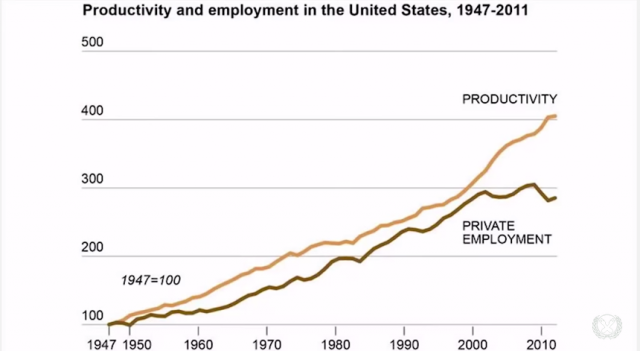Hank and John Green on the Decoupling of Productivity and Wages
Today, if you’ve got eight minutes, consider watching these two Vlogbrothers videos from Hank and John Green about the decoupling of productivity and wages.
If you haven’t been watching the Vlogbrothers regularly, these videos will have a lot of inside jokes and references (Hank’s video is titled “Just for Nerdfighters,” after all) but I’m more interested in what Hank and John have to say about money.
“It’s weird to feel in debt to a lot of people,” Hank begins, as a way to get into the productivity converstation, “and not know how to pay that debt back.”
I know that feeling, both in Hank’s context of “I have a job because a lot of people like what I produce,” and my context of “My friends have cars and sometimes give me rides. What can I give my friends that is worth the same as a car? Am I enough? Is it me plus a bottle of wine and a box of cookies? What’s the equation here?”
And then Hank gets to the decoupling of productivity from wages. In his own words:
I also worry about the decoupling of productivity and wages. Productivity is just all of the benefits to humans that the economy creates, and wages, of course, are the money people make, and they used to be two things that were really closely tied together, and now… they’re not anymore.
I’m worried about what this means for our society, how the rich are just going to get richer and the poor aren’t going to benefit and it’s going to create instability and suffering.
I’m also interested in what the world is going to look like if we’re able to create lots of cool services for people, and they’re going to be so cheap that maybe people don’t even need to pay for them. Like, what does that world look like?
I feel like Hank is being a bit of an optimist here; our economy is magnificent at finding ways to extract value out of people before providing them with services, even for items that are technically “free.” (Someday I will tally up the number of preroll ads, popover ads, autoplay videos, and other advertising I have to watch in order to do the basic research required of my job.)
To me, the world of cheap services, economic instability, and income/class divide is by default a world based on dangling entertainment in front of people while simultaneously advertising to, and extracting data (and cash) from, the same people.
But let’s see what John has to say.
To quote John Green:
Since World War II, wages and productivity were really closely correlated, until about 2000, when there was this great decoupling. Ever since then, productivity has surged but wages have remained stagnant.
I can absolutely believe that, based on my own lived experience, but in case you need proof, here’s a chart that both Vlogbrothers share in their videos:

John continues:
This is part of why we’ve seen this dramatic increase in the disparity of wealth in the United States in the past, like, 20 years. […] Decreasing economic mobility means that, on average, the most talented and innovative people are less likely to get the opportunities that they need in order to create new businesses and make lots of jobs and etc.
I’d consider this partially true, based on my own lived experience. In many ways, talented and innovative people have even more opportunities to share their work and ideas than they did in 2000. What they might not have is an income related to the amount of work they produce — which, again, is sort of true and sort of not. I am the unofficial spokesperson for “my income is directly related to the amount of work I produce, and my income has gone up right alongside my experience and value.”
What is true is that what the economy considers a “fair wage” hasn’t changed much since 2000. That’s why my income can be directly related to my productivity while being decoupled from capital-P Productivity. Meanwhile, the cost of everything else has soared — and you don’t need me, or the Vlogbrothers, to tell you that.
What does John think will happen in the future? He wonders if are going through another Engel’s Pause similar to the one experienced during the Industrial Revolution. Both of these time periods are characterized by rapid technological advancement and a reassesment of what human labor “is worth.” (Also, arguably, a reassessment of “how much labor is possible to squeeze out of a single person.”)
Eventually, John hopes, the economy will stabilize just like it did after the Industrial Revolution, and wages will rise. “But it’s also possible that something entirely different is happening, because the sample size of history is tiny.” Fair enough.
So… what do you think? Are we going to end up in a future full of free services for us to enjoy? Are we going to find ourselves in a new economy, same as the old economy? Or is something entirely different happening here?
Support The Billfold
The Billfold continues to exist thanks to support from our readers. Help us continue to do our work by making a monthly pledge on Patreon or a one-time-only contribution through PayPal.
Comments